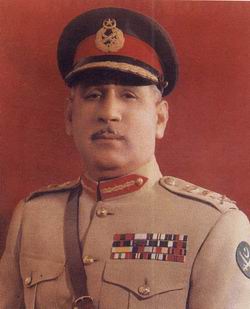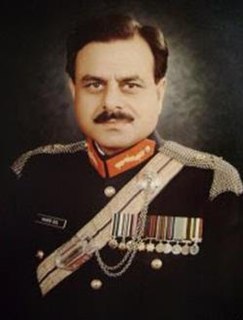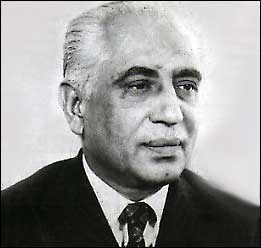Syed Zaigham Hussain Zaidi was a Pakistani photographer. He made his mark working with the Daily Jang in Rawalpindi and later with the Pakistan Times and daily Musawat. He was also the personal photographer of the late Zulfikar Ali Bhutto and Benazir Bhutto when they held the office of prime minister. [1]

The Daily Jang is an Urdu newspaper based in Karachi, Pakistan. It is the oldest newspaper of Pakistan in continuous publication since its foundation in 1939. Its current Group Chief Executive & Editor-in-Chief is Mir Shakil-ur-Rahman. Past editors and contributors have included Mahmood Shaam, Nazir Naji and Shafi Aqeel.
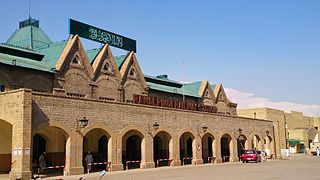
Rawalpindi, commonly known as Pindi, is a city in the Punjab province of Pakistan. Rawalpindi is adjacent to Pakistan's capital of Islamabad, and the two are jointly known as the "twin cities" on account of strong social and economic links between the cities. Rawalpindi is the fourth-largest city in Pakistan by population, while the larger Islamabad Rawalpindi metropolitan area is the country's third-largest metropolitan area.
Pakistan Times (1947–1996) was a Pakistani newspaper, originally established by the Leftist Progressive Papers Ltd based in Lahore. It was owned and operated by Mian Iftikharuddin, a Punjabi politician formerly of the Indian National Congress but of All-India Muslim League since 1946. The newspaper opened publication on 4 February 1947. Its editor-in-chief in the 1940s was the communist poet Faiz Ahmed Faiz. After his arrest in 1951 in connection with the Rawalpindi Conspiracy Case, Mazhar Ali Khan served as the editor-in-chief. The Pakistan Times continued to be an influential newspaper in the 1950s, with its disparaging criticism of the government in participating in the US-sponsored military alliances.
He migrated to Pakistan in 1947 from his home town of Muzaffarnagar in India’s Uttar Pradesh state.
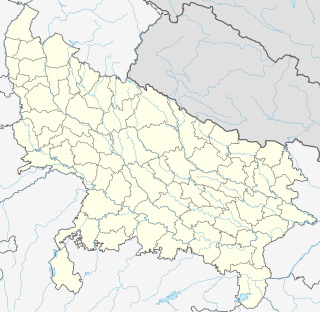
Muzaffarnagar is a city under Muzaffarnagar Urban Metropolitan Region and is controlled by municipal board in the Indian state of Uttar Pradesh and is a part of National Capital Region. It is the headquarters of the Muzaffarnagar district. It is situated midway on Delhi - Haridwar/Dehradun National Highway, the city is also well connected with the national railway network.

Uttar Pradesh is a state considered to be part of central, northern and north-central India. Abbreviated as UP, it is the most populous state in the Republic of India as well as the most populous country subdivision in the world. It is located in the north-central region of the Indian subcontinent, has over 200 million inhabitants. It was created on 1 April 1937 as the United Provinces of Agra and Oudh during British rule, and was renamed Uttar Pradesh in 1950. The state is divided into 18 divisions and 75 districts with the capital being Lucknow. The main ethnic group is the Hindavi people, forming the demographic plurality. On 9 November 2000, a new state, Uttarakhand, was carved out from the state's Himalayan hill region. The two major rivers of the state, the Ganga and Yamuna, join at Allahabad (Prayagraj) and then flow as the Ganges further east. Hindi is the most widely spoken language and is also the official language of the state.
Zaidi was given the President’s Pride of Performance award in 1991 for his contribution to the profession of photojournalism. Some of his best pictures related to the period of President Ayub Khan, Pakistan’s 1965 war with India, the 1970 elections, Mr Bhutto’s tenure as prime minister, the 1972 Shimla peace accord between Pakistan and India and the 1974 Islamic summit conference held in Lahore. [1]
Photojournalism is a particular form of journalism that employs images in order to tell a news story. It is now usually understood to refer only to still images, but in some cases the term also refers to video used in broadcast journalism. Photojournalism is distinguished from other close branches of photography by complying with a rigid ethical framework which demands that the work be both honest and impartial whilst telling the story in strictly journalistic terms. Photojournalists create pictures that contribute to the news media, and help communities connect with one other. Photojournalists must be well informed and knowledgeable about events happening right outside their door. They deliver news in a creative format that is not only informative, but also entertaining.
An exhibition of his photographs was organised in 2003 by the Pakistan National Council of the Arts. [2]




